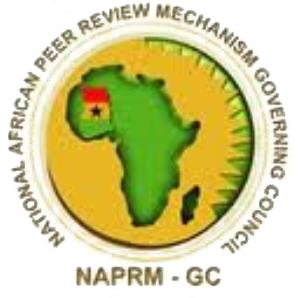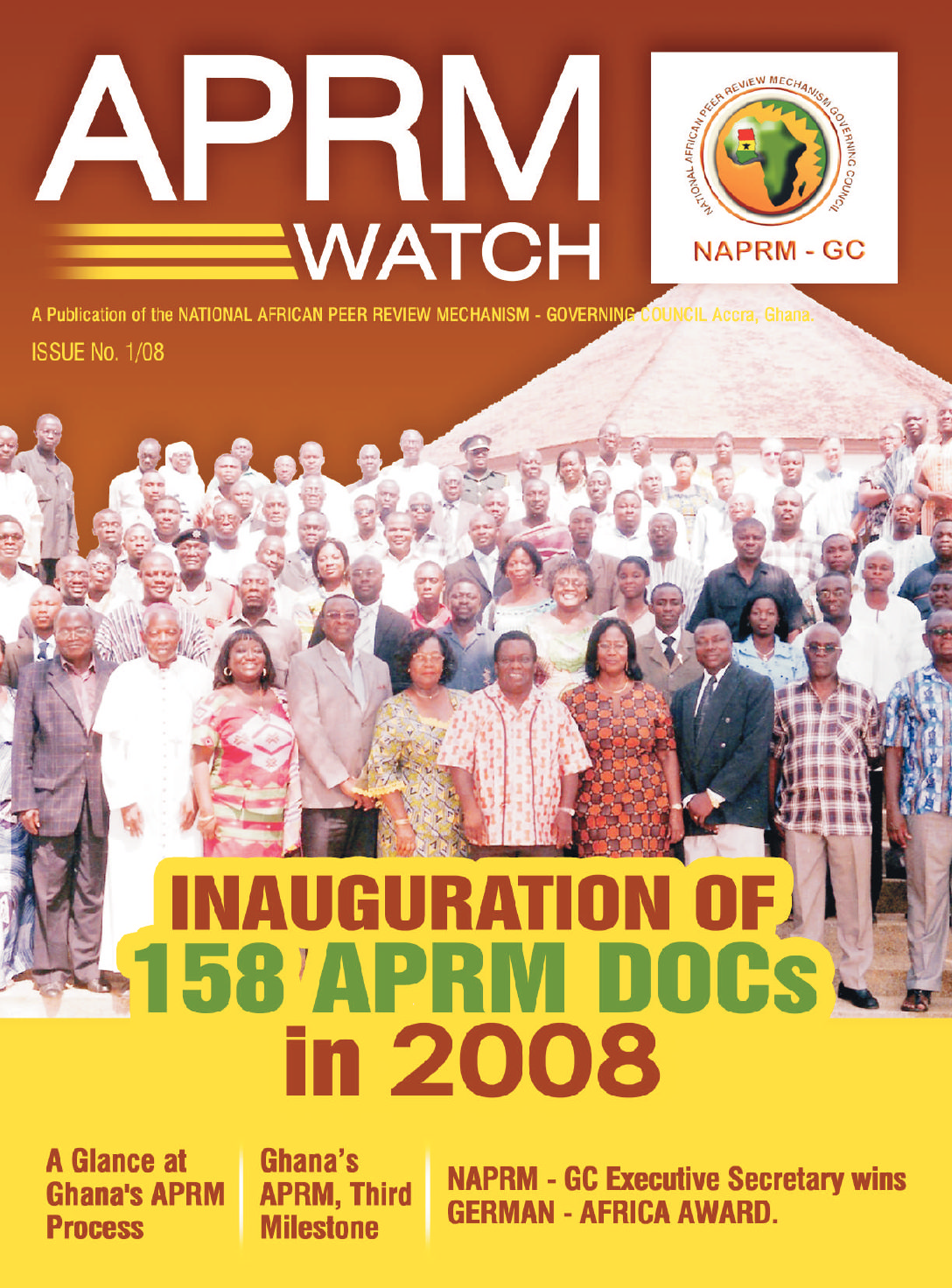Introduction
Ghana was among the first six countries to officially accede to the African Peer Review Mechanism (APRM) by signing the Memorandum of Understanding in March 2003. It was, however, the first to declare its intention to implement the APRM the same year.
Institutional arrangements for the implementation of the APRM Leadership and Management
The APRM Guidelines states that “each participating country must establish a Focal Point for the APR process, which should be a Ministerial level, or a person that reports directly to the Head of State or Government, with the necessary committees supporting it”.
To provide national leadership to manage the implementation of the APRM, a National African Peer Review Governing Council (NAPRM-GC) was inaugurated on March 18, 2004 by ex-President J.A. Kufuor. The Governing Council serves as the Focal Point for APRM in Ghana.
In keeping with the APRM principles of “independence of the APRM process and freedom from manipulation” members of the Governing Council were not made to swear an Oath of Allegiance to the President.
To further strengthen their independence and ensure the credibility of the APR process, the Governing Council has been granted administrative and financial independence. The administrative independence of the Council is evidenced by the fact that the offices of the Governing Council’s Secretariat is not housed under any Ministry, and also that the Governing Council’s progress reports are sent directly to the APR Secretariat in South Africa and copied to the Office of the President.
To ensure the Council performs its duties credibly and without manipulation, Council is allowed to draw its own budget line under the Ministry of Foreign Affairs and Regional Integration.
Country Self-Assessment
The Governing Council conducted extensive dialogue and engagement with stakeholders from all over the country to ensure that the country self-assessment exercise was anchored on national ownership and participation. The Council strategically teamed up with the National Commission for Civic Education to educate and sensitize the populace on the APRM. The Council engaged the services of four lead think tanks to be lead institutions in the four thematic areas of the APRM, and to further ensure that the assessment was independent, credible and technically competent. The institutions were: Centre for Democratic Governance (Democracy and Good Political Governance), Centre for Policy Analysis (Economic Governance and Management), Private Enterprise Foundation (Corporate Governance), and Institute of Statistical, Social and Economic Research (Socio-Economic Development).
Country Review Mission
A 16-member Country Review Mission (CRM) comprising experts from the APR Secretariat, APRM strategic partners (United Nations Development Programme, United Nations Economic Commission for Africa and African Development Bank), partner institutions and independent consultants from 12.
African countries came to Ghana from 4th to 16th April 2005, to undertake an external audit or assessment of the Country Self-Assessment Report.
Ghana’s Review
Ghana was peer reviewed on January 22, 2006 at APR Forum in Khartoum, Sudan.
Implementation arrangements
Ghana’s APRM National Programme of Action (NPOA) was mapped onto the country’s Growth and Poverty Reduction Strategy (GPRS II) to exploit synergies and ensure more targeted use of scarce resources. This action ensured that the NPOA is thus implemented through the policy framework and strategic plans of line Ministries, Departments and Agencies (MDAs). The NPOA is thus financed through the Medium-Term Expenditure Framework (MTEF) and so it is not treated as an add-on to the national development agenda.
Monitoring and Reporting Strategy
Ghana’s APRM Monitoring and Reporting Framework is anchored on the APRM Guidelines on Monitoring and Evaluation. The framework is aimed at tracking: Activities implemented under the NPOA
Resources invested in the implementation
Outcomes achieved in the implementation.
The framework also provides an apolitical platform for national discourse.
A number of stakeholders are involved in the Monitoring and Reporting Strategy.
Ministries, Departments and Agencies report on progress of implementation of activities which fall under their purview in the NPOA;
Technical/Research Institutions and individual experts are contracted to provide independent assessment on progress of implementation Citizens (as beneficiaries) provide information about the relevance and quality of output and services through the use of Citizen Report Cards Ministry of Finance and Economic Planning (Budget Division) tracks resources allocated through the national budget under the Multi Donor Budget Support. The Governing Council is, however, unable to track funds provided directly by development partners to CSOS.
Role of Ordinary Citizens in the Monitoring and Reporting Strategy
The Governing Council has established District APRM Oversight Committees (DOCs) in all the 170 districts in Ghana. The DOCS with the assistance of the NCCE educate and sensitize the local populace on the APRM. They also assist the Governing Council to monitor and report the implementation of the NPOA at the local level. They undertake the monitoring activities through the administration of Citizen Report Cards and conducting Focus Group Discussions. The DOC reports represent civil society perspective on governance and service delivery at the local level.
Outcomes of APRM Implementation in Ghana
Ghana has recorded a number of successes in the implementation of the APRM. Firstly, the APRM is contributing to opening up space for civil society engagement in national dialogue.
Secondly, a number of key legislations have been passed. These include among others the Domestic Violence Act, the Disability Act, the Whistleblower Protection Act, Amendments to the Criminal Code and the Human Trafficking Act. The APRM has also led to the initiation of key social intervention programmes such as the Maternal Health Care, Livelihood Enhancement and Empowerment Programme (LEAP), the Northern Development Fund/Savanna Accelerated Development Authority. Other outcomes are the establishment of a Ministry of Chieftaincy and Culture to deal with chieftaincy issues, and the abolition of the Ministry of Parliamentary Affairs which tended to blur the lines between the Executive and Legislature. It has also resulted in a reduction in aid dependency from a high of 47 percent of GDP to below 20 percent of GDP.


 newsletter-compressed
newsletter-compressed